| Srl | Item |
| 1 |
ID:
007635
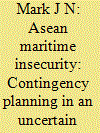

|
|
|
| 2 |
ID:
010471
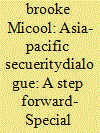

|
|
|
|
|
| Publication |
April 1996.
|
| Description |
156-160
|
|
|
|
|
|
|
|
|
|
|
|
|
|
|
|
| 3 |
ID:
159847
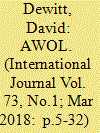

|
|
|
|
|
| Summary/Abstract |
Our focus is on Canadian defence and security activities in the Asia Pacific arena between 1990 and 2015. While governments have asserted the growing primacy of the Asia Pacific, we ask the following: What does Canada’s recent military and security record tell us about the policies and operational aspects of Canadian engagement? How might we assess these in comparison with Ottawa’s declared importance of the Asia Pacific? What might this tell us about the near-term future of Canada’s role and pursuit of interests and opportunities in this complex region? We present and analyze empirical materials drawn from primary sources that inform an assessment of Canada’s presence in the defence and security agenda of the Asia Pacific, during the period that saw Canadian governments declare a deep interest in relations with the Asia Pacific, yet fail to make Canada a full partner with sustained commitments.
|
|
|
|
|
|
|
|
|
|
|
|
|
|
|
|
| 4 |
ID:
054920
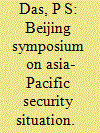

|
|
|
| 5 |
ID:
173187
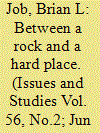

|
|
|
|
|
| Summary/Abstract |
“Middle powers,” variously defined, have served relevant and significant roles in the post-WWII regional and global orders, facilitated by structural conditions of “long peace” among great powers and proactive leadership by and among creative middle powers. Within the complex Asia-Pacific security order, “middle powers” such as Australia, Canada, and South Korea have had the “space” to engage the non-like minded and advance multilateralism with security guarantees from the US. However, Beijing and Washington today are eliminating this space and its associated choices for middle-power diplomacy by increasingly characterizing their rivalry as a confrontation of “existential threats” between incompatible “civilizations” and securitizing trade and technology. China and the US are each selectively ignoring or purposely eroding key aspects of a rules-based international order. This paper highlights the dilemmas of South Korea, Australia, and Canada, middle powers who have found themselves individually and collectively “stuck” facing contradictory global and regional policy choices.
|
|
|
|
|
|
|
|
|
|
|
|
|
|
|
|
| 6 |
ID:
140319
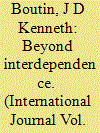

|
|
|
|
|
| Summary/Abstract |
China’s economic and politico-military development is placing considerable strain on the established framework of the trilateral relationship between itself, the United States, and Australia. Specifically, China’s rise is generating security concerns that are politicizing economic relations between the three states. A more guarded approach to economic collaboration will transform trilateralism, which up to now has been characterized by the scope allowed for the discrete pursuit of security and economic relations. This will force political authorities to carefully consider their policy priorities and further strain relations between the states, as well as supporting a more cautious approach to China on the part of the United States and Australia.
|
|
|
|
|
|
|
|
|
|
|
|
|
|
|
|
| 7 |
ID:
147394
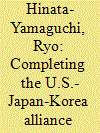

|
|
|
|
|
| Summary/Abstract |
Given the fluid nature of the security environment in the Asia-Pacific, a trilateral security partnership among the United States, Japan, and the Republic of Korea (ROK) is essential to enhance stability in the region. Yet both Japan and the ROK are currently experiencing transitions, as well as facing strategic perception gaps and political difficulties in the bilateral relationship that need to be reconciled. The purpose of this paper is to examine the prospects and issues in establishing a Japan-ROK security partnership to the U.S. alliance triangle. The paper promotes a capability-based cooperation framework for the United States, Japan, and the ROK, focusing on the strategic and operational dimensions that would effectively deal with the security risks in the Asia-Pacific region and beyond. The paper will first outline the developments in Japan-ROK security relations, and then look at the constraints and restraints in the bilateral relations. Next, the paper will assess the political framework needed to facilitate cooperative ties between Japan and the ROK. Then the paper will propose the criteria and viable options to shape the strategic and operational framework for a Japan-ROK partnership. The paper will conclude by arguing that a Japan-ROK partnership is essential in completing the alliance triangle with the United States to serve as the lynchpin of security in the Asia-Pacific.
|
|
|
|
|
|
|
|
|
|
|
|
|
|
|
|
| 8 |
ID:
145143
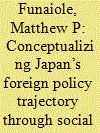

|
|
|
|
|
| Summary/Abstract |
Regional security studies of the Asia-Pacific commonly center upon China’s rise, leaving other actors underresearched. Among these is Japan, whose ongoing reinterpretation of its pacifist constitution may destabilize the region. This article employs Social Identity Theory, a social psychology theory of group behavior, to develop a unique framework that accounts for both the domestic and international constraints acting upon Japan’s foreign policy makers. By analyzing Japan’s foreign policy evolution through the lost decade of the 1990s into the changed landscape of the post-September 11th world, this article identifies a prevailing trend toward “normalization”. It is argued that Japan is on course to further distance itself from the pacifism embodied in Article 9 of its constitution.
|
|
|
|
|
|
|
|
|
|
|
|
|
|
|
|
| 9 |
ID:
134107
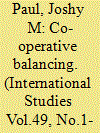

|
|
|
|
|
| Publication |
2014.
|
| Summary/Abstract |
The Asia-Pacific region is facing the threat of a number of potential military conflicts. Unresolved security challenges include the Sino-Japanese and Sino-Indian territorial disputes. The current peace and stability in the region has been achieved through various multilateral mechanisms and constant US involvement in the regional affairs. However, the declining US presence in Asia, the ineffectiveness of different multilateral institutions to establish a security order in the region and China's possible emergence as a great power in Asia may lead to the end of the status quo. In this context, it is pertinent that Asia should be free from both hegemony and power rivalry, and for that, 'co-operative balancing' is the best possible mechanism to achieve a long-term peace and stability. Co-operative balancing is a combination of power balancing and a co-operative security framework. It promotes the independent position of individual countries and strengthens the multilateral mechanisms. This essay concludes that India and Japan can balance against China while bilateral engagement among the three countries tends to reduce their distrust vis-à-vis China.
|
|
|
|
|
|
|
|
|
|
|
|
|
|
|
|
| 10 |
ID:
079693
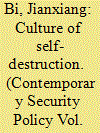

|
|
|
| 11 |
ID:
064062
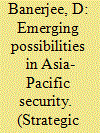

|
|
|
| 12 |
ID:
050449
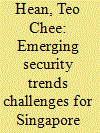

|
|
|
| 13 |
ID:
023276
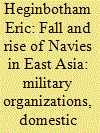

|
|
|
|
|
| Publication |
Fall 2002.
|
| Description |
86-125
|
|
|
|
|
|
|
|
|
|
|
|
|
|
|
|
| 14 |
ID:
011287
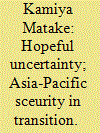

|
|
|
|
|
| Publication |
spring/summer 1996.
|
| Description |
107-129
|
|
|
|
|
|
|
|
|
|
|
|
|
|
|
|
| 15 |
ID:
107230
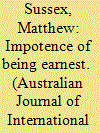

|
|
|
|
|
| Publication |
2011.
|
| Summary/Abstract |
This article critically evaluates Australia's 'creative middle power diplomacy', encapsulated in the three pillars of the Labor government's foreign policy platform. It notes that each pillar has been accorded specific roles in the implementation of Australian foreign policy and makes particular reference to the government's preference for multilateral engagement. The article subsequently demonstrates that such an agenda actually impedes a creative approach to key issues such as trade, climate change and non-proliferation challenges, as well as Australia's participation in Asia-Pacific order-building. It then offers some suggestions for a more flexible posture that is not inconsistent with past Labor approaches, but which also better appreciates regional and global complexities.
|
|
|
|
|
|
|
|
|
|
|
|
|
|
|
|
| 16 |
ID:
169206
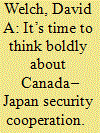

|
|
|
|
|
| Summary/Abstract |
Policy-makers, scholars, and commentators regularly remark upon the unrealized potential of Canada–Japan cooperation, but neither country has taken decisive steps to address it. This reticence is especially noticeable in the security realm. As friendly, like-minded countries with common values, a common vision of international order, and strongly shared security interests in an increasingly tumultuous world, Canada and Japan would be expected to strengthen security ties in meaningful ways. Recent (relatively minor) steps in this direction are welcome. But the time is ripe for the two countries to cement their security partnership through a series of bolder measures ultimately leading to formal alliance.
|
|
|
|
|
|
|
|
|
|
|
|
|
|
|
|
| 17 |
ID:
143909
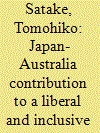

|
|
|
|
|
| Summary/Abstract |
This article discusses how Japan and Australia could contribute to a liberal and inclusive order in the Asia-Pacific region. Critics argue that closer ties between Japan and Australia could undermine the stability of regional security, dividing Asia into ‘mutually hostile armed blocs’ consisting of US allies and China. Contrary to such a view, this article argues that deepening and enhancing Japan–Australia security cooperation could, if carefully managed, help to maintain an inclusive regional order based on institutions, norms and values, as well as a stable balance of power relations. In particular, the article contends that Japan and Australia can contribute to regional order by strengthening their ‘middle-power cooperation’ through regional capacity-building, institution-building, rule-making or norm-setting, and coalition-building, while supporting the US military presence in the region. It then concludes that, despite differing attitudes towards Beijing, Tokyo and Canberra can further contribute to the longevity of the current regional order by inclusive institutional architecture and liberal norms and values.
|
|
|
|
|
|
|
|
|
|
|
|
|
|
|
|
| 18 |
ID:
167635
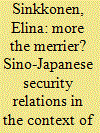

|
|
|
|
|
| Summary/Abstract |
This paper analyses the evolution of Sino-Japanese rivalry in the security sphere concentrating on the Chinese perspective, and placing it within the wider context of complex interstate rivalry between China, Japan and the United States. From a theoretical viewpoint, this research contributes to the literature on interstate rivalry from multiparty perspective, which has been overlooked in existing research. China–Japan–US complex interstate rivalry includes elements of positional, spatial and ideological rivalry simultaneously. When rivalries mix two or more rivalry types, they become more difficult to resolve. The two broad trends of China’s military build-up and deepening US–Japan alliance evolve in tandem intensifying rivalry dynamics and increasing positional elements of rivalry. There are many indications on various levels that for China, controlling Japan’s international ambitions has become less important and more attention is paid to ways in which Japan helps the United States in reaching its objectives in Asia through their alliance agreement. The cases analysed to display complex interstate rivalry include the Taiwan question, territorial disputes in the East and South China Seas, and the North Korean nuclear issue.
|
|
|
|
|
|
|
|
|
|
|
|
|
|
|
|
| 19 |
ID:
023275
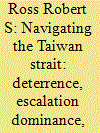

|
|
|
|
|
| Publication |
Fall 2002.
|
| Description |
48-85
|
|
|
|
|
|
|
|
|
|
|
|
|
|
|
|
| 20 |
ID:
009662
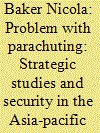

|
|
|
|
|
| Publication |
Sept 1995.
|
| Description |
15-31
|
|
|
|
|
|
|
|
|
|
|
|
|
|
|
|